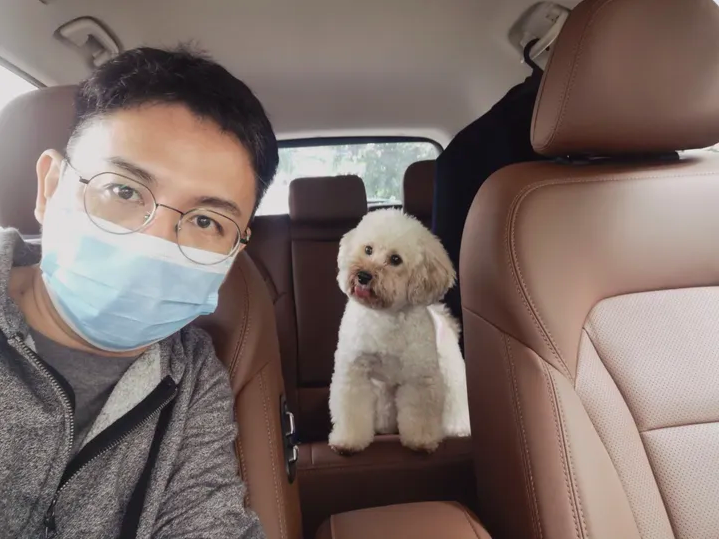Trying To Adopt A Dog During COVID-19? Here’s What You Need To Know
HuffPost
Kelsey Borrensen // August 20, 2020

After talking about getting a dog for the last couple years, my fiancé and I recently adopted a pandemic pup of our own — a spaniel mix we named Cody. But the road to adopting wasn’t as short or smooth as we had imagined.
The demand for dogs has spiked since the pandemic began in March. With many folks spending their days at home for the foreseeable future, they have more time to cuddle, care for and properly train a canine companion now than they would otherwise.
Starting in the spring, my sister scoured Petfinder every morning and would send me a list of dogs in my area that could live comfortably in my one-bedroom apartment. Sometimes, by the time I clicked on the listing, the rescue was already so inundated with applications that they were asking people to stop submitting for that particular pup. And when we did put in an application, we often wouldn’t get a response, even after following up. We were discouraged and wondered if it was going to pan out for us.
KELSEY BORRESEN // Cody, the author's 4-month-old rescue pup.
Finally, in late July, we received the email we had been waiting for: One of the rescues invited us to set up a private appointment to meet the pup. We made the two-hour drive (with our face masks in tow, of course) and fell in love on the spot. We brought our spunky, cuddly boy Cody home that day.
If you’ve been considering adopting a dog during the pandemic, read on for some advice.
Keep in mind that adopting a dog is a long-term commitment.
While it feels like the pandemic will last forever, it won’t. You may be home more or have more free time on your hands these days, but consider what your life will be like when things start to return to normal. What are your work hours like, including the commute? Do you usually go straight from the gym to the office in the morning or straight from the office to happy hour after work? Do you take a lot of vacations or go on spontaneous weekend trips? Ask yourself if a dog is really conducive with your lifestyle and if you’re prepared to make some sacrifices.
“People are working from home — which is fantastic for the transition period when first bringing home a dog — but it’s always a good idea to think about the future and have a rough plan for pet care if one has to go back to work full-time in an office or loses their job,” Erin Stanton, founder of Susie’s Senior Dogs, told HuffPost.
“Rescues receive hundreds, if not thousands, of emails and messages daily and work as quickly as they can to get back to everyone.”
- HEATHER CROWE, FOUNDER OF THE HIT LIVING FOUNDATION
The commitment is also a financial one. The adoption fee can end up costing you several hundred dollars, depending on where you live and whether you get a pet from a government-funded shelter (generally less expensive) or a private rescue that relies on donations to keep their doors open (generally more expensive). Costs like spaying or neutering, vaccinations, veterinary care and microchipping may be included in the adoption fee, but it’s best to check with the shelter or rescue so you know what to budget.
Over the course of a year, caring for a dog can cost you thousands of dollars between food, vet bills, medications, dog walking, pet sitting or boarding and other miscellaneous expenses.
Prioritize quality over quantity when it comes to applications.
Take the time to thoughtfully answer any application questions — don’t rush through them just so you can complete more apps. Many rescues will ask things like what veterinarian you plan to take your pet to, how you’d train them, how long they’d be alone during the day, where they’d sleep at night and what you’d do with your pet if you had to move. Don’t leave these questions blank — rescues want to see you’ve given thought to these things.
“Our rescue also likes to ask potential adopters to tell us about themselves in their own words and why they want to adopt,” said Heather Crowe of the HIT Living Foundation in Los Angeles. “This is really your time to shine and show us your personality. Be as detailed as possible and take the time to share your story in your own words to help us get to know you and how you might be the best match for the dog you’re applying for.”
CHEE GIN TAN VIA GETTY IMAGES
If you want your application to stand out, be thoughtful when filling it out.
Instead of casting a wide net, it may help to focus your efforts on just a few rescues in your area, City Dogs Rescue adoption counselor Jillian Molina told NPR. In our experience, we had one rescue tell us that the dog we had our hearts set on had been adopted, but since they had already approved our application, we could just email them in the future if we were interested in another one of their pups without having to reapply all over again.
If you’re open to other dogs besides the one you applied for, say so.
Doing so will help your chances in case things don’t pan out with the pup you submitted an application for. You can either include the names of other dogs you saw on the rescue’s website or social media that you liked or list what qualities you’re looking for in terms of age, size, temperament, energy level — as well as anything you’d like to avoid — so they can match you with the right pet, Crowe said.
“Many times rescues have animals that aren’t yet listed, and after reading through your application, they may have the perfect rescue for which you’ve been looking,” she said.
The process might take some time, so be patient.
Animal shelters have been handling a huge influx of applications during the pandemic with limited staffing. So don’t expect to get a response right away.
“Many rescues, especially smaller ones like ours, are almost 100% volunteer-run,“ Crowe said. “This means that the people behind the scenes, like myself, have a job outside of the rescue, or a family, or a number of other things that also demand their attention.”
“Older dogs are still the ones lingering in shelters and more often left behind.”
- ERIN STANTON, FOUNDER OF SUSIE’S SENIOR DOGS
Hang in there and don’t let these delays discourage you from adopting.
“Rescues receive hundreds, if not thousands, of emails and messages daily and work as quickly as they can to get back to everyone,” Crowe added.
Remember there are plenty of animals in need of a safe and loving home.
“If it didn’t work out with the one you thought was your next family member, it means that they’re still out there waiting for you to find each other,” Crowe said.
Consider adopting an older dog.
Puppies and young dogs tend to receive more adoption interest than senior dogs.
“Older dogs are still the ones lingering in shelters and more often left behind,” Stanton said. “I encourage people to seek out the older dogs!”
And as adorable as puppies may be, they generally require more work, time and energy than their older counterparts. They need to be house-trained, socialized and constantly supervised.
Prepare for an adjustment period once you bring your pup home.
You should anticipate an adjustment period of days, weeks or even months in some cases as your dog acclimates to their new setting, Crowe said.
“Remember, a lot of rescue dogs have experienced abuse, neglect and have been abandoned by their previous families, either left on the streets to fend for themselves or left at a shelter — a strange, cold, loud and scary place,” she said.
Be patient with your pup’s progress as they settle in.
“They need you to provide them with the time and a safe space to transition and decompress from their previous life,” Crowe said.
“Patience is key to setting you and your new rescue up for a long and happy, successful life together,” she added.


